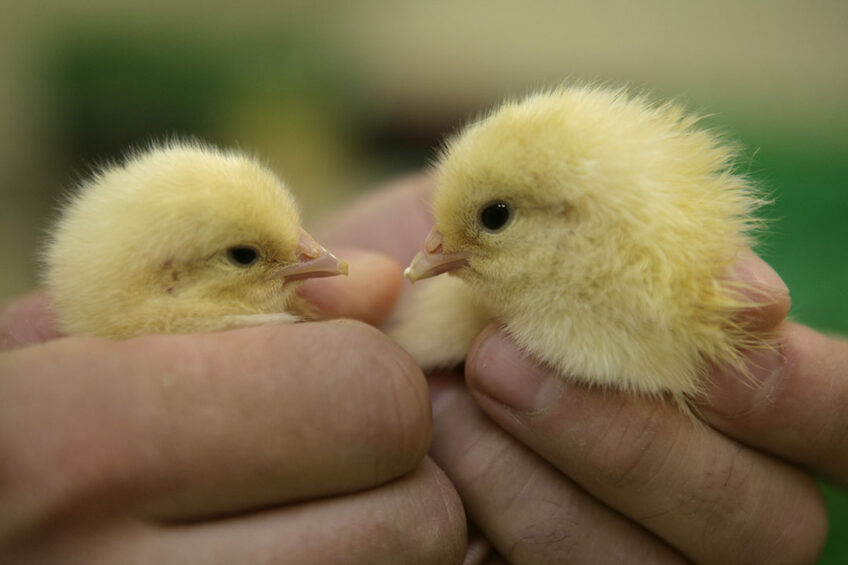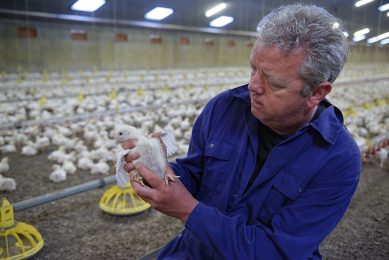Alpha-monolaurin boosts immune response of IB-vaccinated broilers

Alpha-monolaurin stimulates the immune response of broilers after vaccination against infectious bronchitis (IB), according to a new study published in the Journal of Applied Poultry Research.
The authors noted that the higher number of antibodies found in animals receiving alpha-monolaurin in their feed may result in better protection against future infections.
Infectious bronchitis remains one of the most significant diseases in today’s poultry industry. It is caused by infectious bronchitis virus – the coronavirus of poultry – it is acute and spreads quickly under current commercial conditions.
The virus can affect the respiratory organs, kidneys and intestines. Clinical signs, such as growth depression, coughing, nasal and ocular discharge, are often seen, especially in young broilers. Co-infection with Mycoplasma, Escherichia coli or Avibacterium paragallinarum can exacerbate the disease.
No guarantees with vaccination
As there is no commercially available treatment against infectious bronchitis, vaccination with live-attenuated or killed viruses is usually applied, along with biosecurity measures. A complicating factor, however, is the unpredictable nature of the virus: it mutates quickly and new serotypes and variants emerge continually.
In practice, this means that vaccination does not necessarily guarantee full protection. Infectious bronchitis virus infections therefore remain a significant source of economic loss in the global poultry industry.
Promising effects of alpha-monolaurin
Because of the considerable economic impact of infectious bronchitis, Framelco’s ongoing research focuses closely on alleviating the infectious bronchitis virus-induced consequences of infections on poultry farms. One area of research concentrates on the use of alpha-monolaurin.
Alpha-monolaurin, a monoester formed from lauric acid, has become an important feed additive due to its antipathogenic and immune-modulating properties. Scientific research has previously shown that when added to the feed of broilers, alpha-monolaurin exhibited not only antibacterial properties but strong antiviral properties as well.
Recently, the effect of a commercially available formulation of alpha-monolaurin (FRA C12 Dry) on infectious bronchitis virus vaccine uptake and the elicited antibody response was evaluated. Ross 308 broilers were orally vaccinated with live-attenuated infectious bronchitis virus.
Enhanced viral clearance
The vaccination did its job well, as became clear from the high proportion of infectious bronchitis virus positive birds in the days following vaccination (Figure 1).
At days 9 and 15, 100% of the birds from both the control group and the FRA C12 Dry group tested positive for infectious bronchitis virus. Supplementation with alpha-monolaurin therefore did not negatively affect the uptake of the vaccine. At day 30 after vaccination, the percentage of infectious bronchitis virus-positive birds in both groups decreased, indicating that some of the birds established elimination of the virus. Interestingly, the percentage of infectious bronchitis virus-positive birds in the product group was markedly smaller compared to the control group (56% compared to 80%, respectively).
It is suggested that feeding a diet supplemented with alpha-monolaurin results in enhanced clearance of vaccine-derived infectious bronchitis virus. This indicates that FRA C12 Dry may have supported the immune response elicited by vaccination.
Figure 1 – IBV RNA in tracheal swabs obtained on days 5, 9, 15, and 30.

More antibodies
To test the hypothesis that alpha-monolaurin indeed boosts the immune response in broilers after vaccination, the researchers determined the antibody titer against infectious bronchitis virus in blood samples. The birds acquired immunity against infectious bronchitis virus as specific antibody titers gradually increased from day 15 to day 40 after vaccination.
As expected, significantly higher amounts of antibodies were found in birds receiving FRA C12 Dry compared to the vaccinated control birds (Figure 2). Together with the observation that more birds were able to establish faster clearance of vaccine-derived infectious bronchitis virus, this suggests that alpha-monolaurin indeed strengthens the immune response. The researchers considered that this may result in better protection against future infections.
Figure 2 – The IBV antibody titer in serum samples acquired on days 15, 30, and 40.

Dedicated biochemical process
The main component of FRA C12 Dry is alpha-monolaurin, the result of a dedicated biochemical process: esterification of lauric acid (a medium chain fatty acid with 12 C-atoms) to the first position of a glycerol molecule. It is this specific molecular structure that enables it to exert strong antipathogenic effects, likely by attacking bacterial cell membranes as well as viral fat-envelopes, resulting in serious damage to a great range of pathogens. Research has further shown the inflammation-inhibiting properties of alpha-monolaurin.
A closer look at its mechanisms reveals several interesting facts. Alpha-monolaurin has been proven to be biologically more active in neutralising viruses and bacteria compared to ‘free’ lauric acid as commonly found in commercial products. In addition, alpha-monolaurin is not affected by the pH range found in the gastrointestinal tract and hence is stable throughout the complete intestinal tract and resistant to enzymatic breakdown. Both its anti-pathogenic effect and specific characteristics mean that FRA C12 Dry is gaining in popularity on poultry farms facing viral challenges like Newcastle disease and infectious bronchitis.
Interesting tool
Infectious bronchitis is still one of the most prevalent diseases impacting poultry production. Poultry farmers constantly have to deal with uncertainty about the effectiveness of their vaccination programme. Now, FRA C12 Dry could offer a useful tool in the fight against infectious bronchitis. Beside its scientifically proven antipathogenic effects, this study shows that this feed additive can stimulate the immune response elicited by infectious bronchitis vaccination in broilers.
References available on request.



